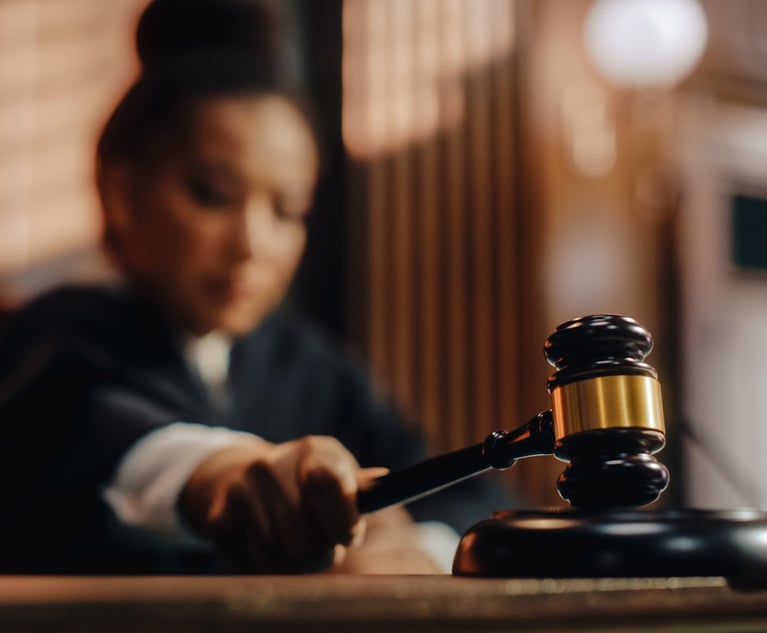Feds Want Ex-Phila. Traffic Court Judge's $36K Inheritance for Restitution
Federal prosecutors have staked a claim to $36,000 they say former Philadelphia Traffic Court Judge Robert Mulgrew inherited from his deceased father, arguing that it should be applied to the $190,000 in restitution the ex-judge owes for a fraud conviction, according to a recent court filing.
December 05, 2017 at 04:49 PM
4 minute read

Federal prosecutors have staked a claim to $36,000 they say former Philadelphia Traffic Court Judge Robert Mulgrew inherited from his deceased father, arguing that it should be applied to the $190,000 in restitution the ex-judge owes for a fraud conviction, according to a recent court filing.
Priory to his perjury conviction in the prosecution stemming from the Philadelphia Traffic Court ticket-fixing scandal, Mulgrew pleaded guilty to one count of wire fraud and one count of filing a false tax return as part of a scheme to defraud the state Department of Community and Economic Development out of state grant funds awarded to nonprofits.
For that, he was sentenced in August 2014 to 30 months in prison, three years of probation and must pay the state $199,000 in restitution. Mulgrew, who is currently in a halfway house, and his co-defendant have made little progress in paying off the debt, according to court papers filed by the U.S. Attorney's Office for the Eastern District of Pennsylvania.
Mulgrew was incarcerated at the Federal Correctional Institution at Fort Dix in New Jersey, where in May 2017 he received a $36,000 check the government believes came from the estate of his father, Robert J. Mulgrew. According to federal prosecutors, the money remained in the younger Mulgrew's inmate trust account, but was given to him directly when he was transferred from Fort Dix to the halfway home.
Prosecutors contacted Mulgrew's lawyer about the money but claim they haven't heard back. They further assert Mulgrew is responsible for alerting the government about any changes in his financial situation. His counsel of record, Angela Halim, did not return a call seeking comment.
“Mulgrew has disregarded this court's restitution order and failed to pay restitution from the inheritance funds, nor has he contacted the government or this court of this material change in his financial resources,” the government's court papers said. “The interests of justice require that this court amend the restitution payment schedule in this case to property reflect Mulgrew's financial resources and ability to pay restitution based on his changed financial resources.”
Mulgrew and co-defendant Lorraine Dispaldo, a former administrative aide to state Rep. Bill Keller, D-Philadelphia, were charged by prosecutors with misdirecting much of a $397,000 grant to Community to Police Communications, intended for buying communications equipment for police officers, as well as a $460,000 grant awarded to the Friends of Dickinson Square to maintain the square and the surrounding area.
Instead of using the funds to maintain Dickinson Square Park, in ways such as buying park benches and landscape materials, and to purchase communications equipment for the police, as well as to purchase materials to protect police by securing the vacant lots and buildings, the defendants “paid tens of thousands of dollars in grant funds to Mulgrew's relatives and associates, including the teenage sons of his friends, and to [Keller's] lifelong friends, for work purportedly done on behalf of FDS and CPC,” authorities alleged in the indictment.
Mulgrew was the vice president of the Friends of Dickinson Square at the same time that he was an employee of the International Brotherhood of Electrical Workers, Local 98, and later at the same time he was a Traffic Court judge starting in January 2008, according to the indictment.
The federal grand jury further accused Mulgrew and Dispaldo of using grant funds for their personal expenditures, the indictment said, with money being put toward pickup trucks, an $827 camera, cigarettes and Christmas trees, among other things.
Dispaldo pleaded guilty in 2014 to 30 counts of mail fraud, one count of wire fraud, one count of conspiracy to commit mail and wire fraud, four counts of filing false personal income-tax returns, and one count of bankruptcy fraud.
Mulgrew's guilty plea was made in exchange for prosecutors dropping all charges against Mulgrew's wife, Elizabeth Mulgrew.
The Mulgrews were charged with seven counts of tax fraud, including allegedly filing false tax returns in which they did not list over $67,000 in additional taxable income and in which they listed allegedly false business deductions.
In addition to his 30-month sentence in that case, Robert Mulgrew was handed an additional 18-month sentence in December 2014 for his perjury conviction. The judge in that case denied Mulgrew's request for the 18-month sentence to run concurrently with his previous sentence.
This content has been archived. It is available through our partners, LexisNexis® and Bloomberg Law.
To view this content, please continue to their sites.
Not a Lexis Subscriber?
Subscribe Now
Not a Bloomberg Law Subscriber?
Subscribe Now
NOT FOR REPRINT
© 2025 ALM Global, LLC, All Rights Reserved. Request academic re-use from www.copyright.com. All other uses, submit a request to [email protected]. For more information visit Asset & Logo Licensing.
You Might Like
View All
Phila. Court System Pushed to Adapt as Justices Greenlight Changes to Pa.'s Civil Jury Selection Rules
5 minute read
Pa. Appeals Court: Trial Judge Dismissed Med Mal Claims Without Giving Plaintiffs Proper Time to Fight Back
4 minute read
Phila. Judge Upholds $68.5M Verdict Over Construction Worker's Death
3 minute readTrending Stories
Who Got The Work
Michael G. Bongiorno, Andrew Scott Dulberg and Elizabeth E. Driscoll from Wilmer Cutler Pickering Hale and Dorr have stepped in to represent Symbotic Inc., an A.I.-enabled technology platform that focuses on increasing supply chain efficiency, and other defendants in a pending shareholder derivative lawsuit. The case, filed Oct. 2 in Massachusetts District Court by the Brown Law Firm on behalf of Stephen Austen, accuses certain officers and directors of misleading investors in regard to Symbotic's potential for margin growth by failing to disclose that the company was not equipped to timely deploy its systems or manage expenses through project delays. The case, assigned to U.S. District Judge Nathaniel M. Gorton, is 1:24-cv-12522, Austen v. Cohen et al.
Who Got The Work
Edmund Polubinski and Marie Killmond of Davis Polk & Wardwell have entered appearances for data platform software development company MongoDB and other defendants in a pending shareholder derivative lawsuit. The action, filed Oct. 7 in New York Southern District Court by the Brown Law Firm, accuses the company's directors and/or officers of falsely expressing confidence in the company’s restructuring of its sales incentive plan and downplaying the severity of decreases in its upfront commitments. The case is 1:24-cv-07594, Roy v. Ittycheria et al.
Who Got The Work
Amy O. Bruchs and Kurt F. Ellison of Michael Best & Friedrich have entered appearances for Epic Systems Corp. in a pending employment discrimination lawsuit. The suit was filed Sept. 7 in Wisconsin Western District Court by Levine Eisberner LLC and Siri & Glimstad on behalf of a project manager who claims that he was wrongfully terminated after applying for a religious exemption to the defendant's COVID-19 vaccine mandate. The case, assigned to U.S. Magistrate Judge Anita Marie Boor, is 3:24-cv-00630, Secker, Nathan v. Epic Systems Corporation.
Who Got The Work
David X. Sullivan, Thomas J. Finn and Gregory A. Hall from McCarter & English have entered appearances for Sunrun Installation Services in a pending civil rights lawsuit. The complaint was filed Sept. 4 in Connecticut District Court by attorney Robert M. Berke on behalf of former employee George Edward Steins, who was arrested and charged with employing an unregistered home improvement salesperson. The complaint alleges that had Sunrun informed the Connecticut Department of Consumer Protection that the plaintiff's employment had ended in 2017 and that he no longer held Sunrun's home improvement contractor license, he would not have been hit with charges, which were dismissed in May 2024. The case, assigned to U.S. District Judge Jeffrey A. Meyer, is 3:24-cv-01423, Steins v. Sunrun, Inc. et al.
Who Got The Work
Greenberg Traurig shareholder Joshua L. Raskin has entered an appearance for boohoo.com UK Ltd. in a pending patent infringement lawsuit. The suit, filed Sept. 3 in Texas Eastern District Court by Rozier Hardt McDonough on behalf of Alto Dynamics, asserts five patents related to an online shopping platform. The case, assigned to U.S. District Judge Rodney Gilstrap, is 2:24-cv-00719, Alto Dynamics, LLC v. boohoo.com UK Limited.
Featured Firms
Law Offices of Gary Martin Hays & Associates, P.C.
(470) 294-1674
Law Offices of Mark E. Salomone
(857) 444-6468
Smith & Hassler
(713) 739-1250






